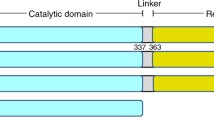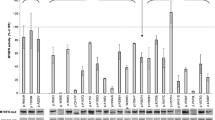Abstract
Methylenetetrahydrofolate reductase and cobalamin-dependent methionine synthase catalyze the penultimate and ultimate steps in the biosynthesis of methionine in prokaryotes, and are required for the regeneration of the methyl group of methionine in mammals. Defects in either of these enzymes can lead to hyperhomocysteinemia. The sequences of the human methylenetetrahydrofolate reductase and methionine synthase are now known, and show clear homology with their bacterial analogues. Mutations in both enzymes that are known to occur in humans and to be associated with hyperhomocysteinemia affect residues that are conserved in the bacterial enzymes. Structure/function studies on the bacterial proteins, summarized in this review, are therefore relevant to the function of the human enzymes; in particular studies on the effects of bacterial mutations analogous to those causing hyperhomocysteinemia in human may shed light on the defects associated with these mutations.
Similar content being viewed by others
Author information
Authors and Affiliations
Rights and permissions
About this article
Cite this article
Matthews, R., Sheppard, C. & Goulding, C. Methylenetetrahydrofolate reductase and methionine synthase: biochemistry and molecular biology. Eur J Pediatr 157 (Suppl 2), S54–S59 (1998). https://doi.org/10.1007/PL00014305
Issue Date:
DOI: https://doi.org/10.1007/PL00014305




